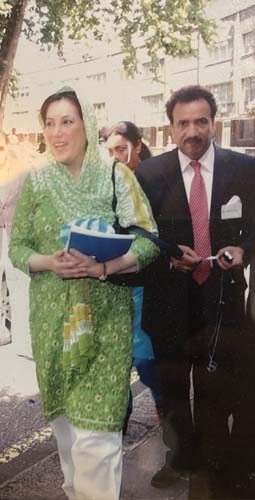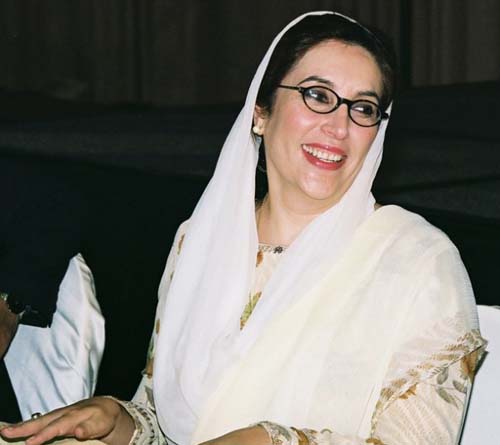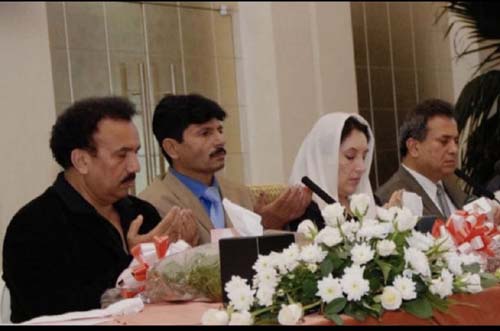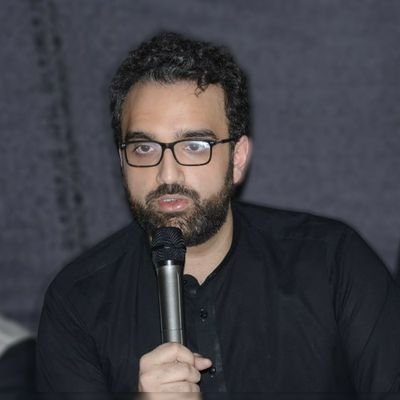
Umar Malik pays glowing tribute to Benazir Bhutto
Staff Writer
Islamabad: Pakistan People’s Party (PPP) leader Umar Malik this week paid glowing tribute to two-time Prime Minister Benazir Bhutto who was assassinated in 2007.
Speaking at a party that he hosted on her birthday, Umar Malik said Benazir Bhutto’s assassination had left a huge vacuum in Pakistani politics.
He recalled that after completion of her studies, Benazir Bhutto aspired to be a diplomat, but circumstances led her to continue her father Zulfiukar Ali Bhutto’s legacy as a political leader.

Soon after her return in 1977, her father was ousted as the prime minister in a military coup and imprisoned, and martial law was declared, he added.
Umar Malik mentioned that when Zukfikar Ali Bhutto was executed, Benazir Bhutto launched her full time into politics. “I told him on oath in his death cell that I would carry on his work,” Benazir Bhutto later said.
Benazir Bhutto, he said, paid a price for her promise. Over the next five years, with the Pakistan People’s Party outlawed, Benazir Bhutto was in and out of detention, sometimes at home, under house arrest, or in prison, under harrowing conditions.
She was allowed to leave Pakistan in 1984 for treatment of a serious ear infection. She settled in London, but the saga of her family’s life continued with the mysterious death of one of her two brothers at his home on the French Riviera. Some accounts suggested that he had been poisoned.

Umar Malik said that when martial law in Pakistan was lifted in December 1985, Benazir Bhutto felt the time had come to return to her homeland.
“Her homecoming in April 1986, in Lahore, was tumultuous, celebrated by hundreds of thousands of Pakistanis who thronged the streets and forced her motorcade to slow to such a crawl that it took 10 hours to travel eight miles,” he maintained.
In her elegant British-inflected accent, she called on Zia ul-Haq to resign, saying that it was “a bad year for dictators,” a reference to the fall of Ferdinand Marcos in the Philippines and Jean-Claude “Baby Doc” Duvalier in Haiti.
The momentum of her welcome propelled her on a national tour and then her party to victory in parliamentary elections in November 1988.
Benazir Bhutto despite having life threats did not falter and continued her struggle with unwavering determination to achieve her ideals, Umar Malik narrated.
He said Benazir Bhutto faced constant character assassination and perpetual resistance from religious quarters who would try to stir up public’s emotions by proclaiming that a government headed by a woman was un-Islamic. Yet she managed to leave behind a legacy of commitment to democracy, economic empowerment of the downtrodden and social equality that is rivalled by only the one left by her father.

He said during her tenure, Benazir Bhutto strived hard to elevate the status of Pakistani women. She employed all of her resources for the betterment of womenfolk.
She established the first women bank, a separate ministry for women affairs, inducted female judges in judiciary, made a separate police station for women, directed for five percent quota for women in every government department, set up Muslim women’s parliamentary union, established women’s sports board, and restored women seats in national and provincial assemblies.
Umar Malik said even after her death, Benazir Bhutto continues to rule our hearts and minds regardless of the fact that she led quite an unusual life.
As she was once quoted to have said, “I have led an unusual life. I have buried a father killed at age 50 and two brothers killed in the prime of their lives. I raised my children as a single mother when my husband was arrested and held for eight years without a conviction-a hostage to my political career.”

Umar Malik said: “Benazir Bhutto was undoubtedly a woman of great achievements. Some of her achievement came to limelight and were acknowledged even after her death, as is the case with a posthumous United Nations Human Rights Prize conferred on her in 2008.”
